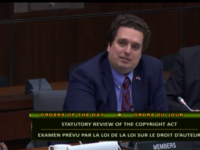AI Minister Evan Solomon’s AI public consultation – framed as a 30 day sprint – wrapped up last week with expectations that the government will unveil a new AI strategy by the end of the year. Much of the emphasis to date has focused on how Canada can ensure that it is an AI leader with Solomon previously warning about how the government may have “over-indexed” on AI regulation. Mark Surman, the President of Mozilla, has been a leading global voice on digital policy for many years. He has been increasingly vocal about the benefits of public AI as a counter to the big tech leadership. He joins the Law Bytes podcast for a wide ranging discussion on digital policy, the role of open source, and benefits of a public AI model.
Post Tagged with: "open source"
The LawBytes Podcast, Episode 32: Reflections from the Open Source Member of Parliament – A Conversation with Ex-MP David Graham
David Graham was not your typical Member of Parliament. A Liberal MP from the Quebec riding of Laurentides-Labelle, Graham brought a background in open source issues to Parliament Hill. Over his four years as an MP, Graham was seemingly everywhere when it came to digital policy. Whether in the House of Commons talking net neutrality, the Industry committee copyright review or the Ethics committee work on privacy, Graham emerged as the rare MP equally at home in the technology and policy worlds. Graham’s bid for re-election fell short, but this week he joins the Lawbytes podcast to reflect on his experience in Ottawa with thoughts on copyright, privacy, technology policy, and the use of digital tools for advocacy purposes.
The Daily Digital Lock Dissenter, Day 38: The Canadian Association for Open Source
The key policy for software authors is “technological measures”, given this policy is about what software the owners of computers are and are not allowed to install and use on their own hardware. The Liberal Bill C-60 recognized the nuances of the 1996 WIPO treaties and tied anti-circumvention legislation to activities that would otherwise infringe coyright. The WIPO treaties use language such as:
Contracting Parties shall provide adequate legal protection and effective legal remedies against the circumvention of effective technological measures that are used by authors in connection with the exercise of their rights under this Treaty or the Berne Convention and that restrict acts, in respect of their works, which are not authorized by the authors concerned or permitted by law.
Being “used by authors in connection with” and “or permitted by law” suggests that anti-circumvention legislation should be tied to infringing activities. Copyright and other laws (including privacy law) should trump technological measures when there is a conflict, not the other way around. By clarifying that the anti-circumvention legislation is tied to copyright, the legislation could also avoid providing any protection for technical measures applied to devices by other than their owners.
Opening Up Canada’s Digital Economy Strategy
The federal government’s national consultation on a digital economy strategy is now past the half-way mark having generated a somewhat tepid response so far. My weekly technology law column (Toronto Star version, homepage version) argues the consultation document itself may bear some of the blame for lack of buzz since the government asks many of the right questions, but lacks a clear vision of the principles that would define a Canadian digital strategy.
One missed opportunity was to shine the spotlight on the principle of "openness" as a guiding principle. In recent years, an open approach has found increasing favour for a broad range of technology policy issues and has been incorporated into many strategy documents. For example, New Zealand identified "openness is a central principle of [its] Digital Strategy 2.0."
The consultation document includes a brief reference to open access for government-funded research, but it seemingly ignores the broader potential for a strategy with openness policies as a key foundational principle.
Where might an openness principle make sense?
The IIPA’s Opposition to Open Source Software
Digital Copyright Canada does a nice job of reviewing the IIPA's submissions to the USTR Special 301 process, noting its criticisms of Brazil, India, Indonesia, Philippines, Thailand, and Vietnam for supporting open source software. The posting notes "the fact the IIPA is encouraging countries to have policies which increase infringement […]








